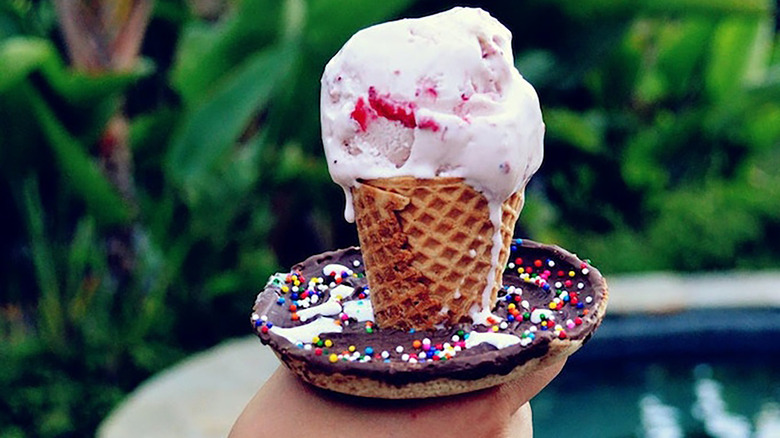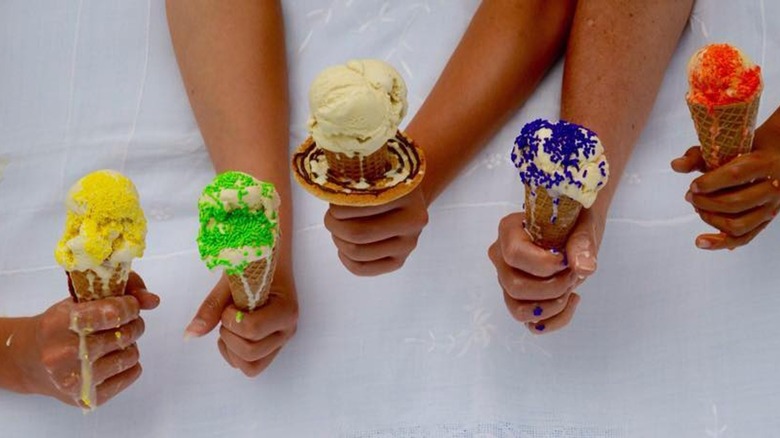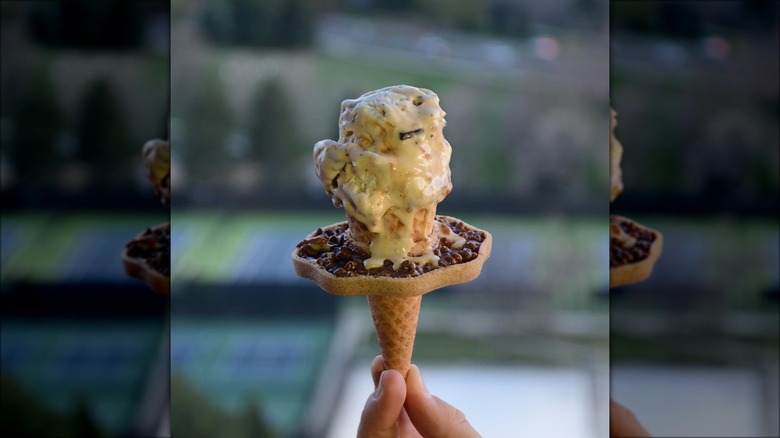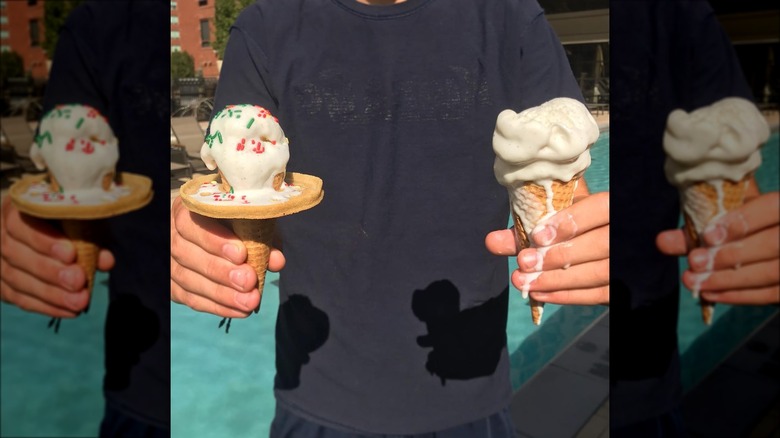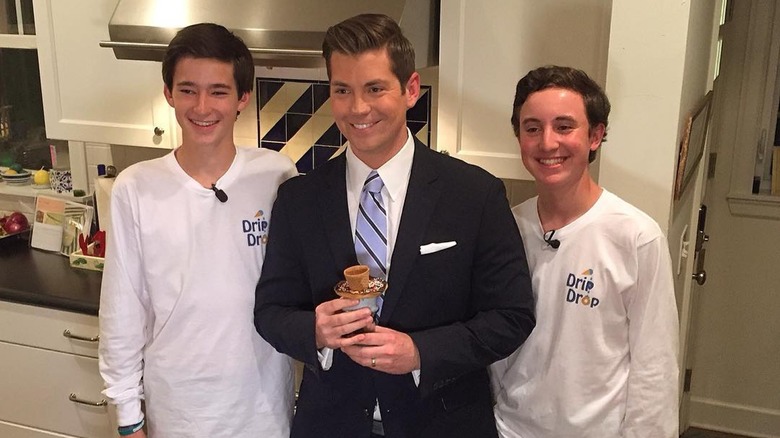Here's What Happened To Drip Drop After Shark Tank
"Shark Tank" is a little different than other reality shows on TV. Sure, its hosts have all become celebrities in their own right, but what's even more exciting than seeing the Sharks in action is seeing a product go from a simple small business or concept to a hugely successful company, like what happened with the people behind Scrub Daddy and some of the other best kitchen tools we've seen on "Shark Tank."
But Scrub Daddy isn't the only memorable product we've seen on the hit show. One that ice cream fans in particular, or parents who are tired of scrubbing congealed dairy from their kids' sleeves, might remember is the Drip Drop. This tasty product is an edible waffle cone ring that can slide onto an ice cream cone, acting as a shelf to catch any drips from the melting ice cream or sprinkles and other toppings that slide off the cone as it's being eaten. The product was developed by the two teen boys behind the company, Oliver Greenwald and Sam Nassif, who were the youngest contestants to ever appear on the show without an adult. They were just freshmen in high school when they appeared on the show. And initially, it seemed like their stint on "Shark Tank" could help launch their business on a much larger scale. So what ended up happening?
Drip Drop got Barbara Corcoran on board
Drip Drop appeared on Season 7, Episode 25 of "Shark Tank" in 2016. The Drip Drop was invented in 2011 when founders Oliver Greenwald and Sam Nassif were in fifth grade, as their entry into the Gates Invention & Innovations competition, according to The Denver Post. The pair's invention won the contest and they got the funding to work with an attorney to develop their patent, a process which took three years. After the Drip Drop was patented, they wound up bringing their business all the way to "Shark Tank."
The two appeared on the show seeking an investment of $50,000 from the Sharks, in return for 20% of the company. At first, none of the Sharks seemed like they would take the bait. Mark Cuban thought they should first try to get their product sold in local ice cream shops, while Robert Herjavec thought they should work with ice cream manufacturers instead. But finally, Barbara Corcoran was swayed and made a counteroffer that wasn't too far off from their ask — $50,000 for a 33.3% stake in the company, which the duo accepted.
What happened to Drip Drip after Shark Tank?
After appearing on "Shark Tank," things unfortunately didn't go so smoothly for Drip Drop. The founders walked away having secured a deal with Barbara Corcoran ... or at least, that's what it seemed like on television. But in actuality, they were never able to finalize their deal with Corcoran. They had issues making any kind of deals with ice cream cone manufacturers, who said that they needed a proven sales record — and at the time, the founders had never actually sold a Drip Drop before.
"Even though that was the toughest moment, out of that came a positive aspect of the company," Oliver Greenwald shared with The Denver Post. Along with co-founder Sam Nassif, the two continued to hone and perfect the Drip Drop design, and Nassif said that after their "Shark Tank" episode aired, they heard from more than 500 businesses and consumers asking about their product. The duo eventually headed to Kickstarter to try to crowdsource some funding for their idea. They did manage to raise a fair bit of money — about $7,000 from 82 backers — and baked and sent out Drip Drops to everyone who pledged $15 or more. They also created merchandise like T-shirts and sweatshirts that featured the brand's name and colorful images of the Drip Drop in action.
Why did Drip Drop go out of business?
In spite of the hard work of co-founders Oliver Greenwald and Sam Nassif, Drip Drop failed to get off the ground in any meaningful way. Eventually, Greenwald left the company, leaving Nassif to figure out how to salvage their business at just 18 years old (via Wharton Global Youth Program). He managed to get Drip Drops into three Denver-area ice cream parlors, making and selling 1,500 units over the summer of 2019. He was getting enough leverage that Joy Cone, one of the biggest ice cream cone manufacturers in the world, was allegedly interested in learning more about the product.
But between their deal with Barbara Cocoran falling through, which lead to them losing out on the $50,000 investment, and the fact that they were so young and lacked the experience and connections that older entrepreneurs might have, it seems that their potential manufacturing partners might have found working with the boys a bit too risky. The licensing deals they dreamt of never materialized. Drip Drop's last Facebook post was in 2019, and their Instagram page hasn't been active since then, either.
What's next for Drip Drop's founders?
Drip Drop may no longer be around, but the young founders of the company who appeared on "Shark Tank" seem to have pretty promising futures ahead. Oliver Greenwald attended Duke University, where he studied computer science and human interaction design, volunteered at a local fire station, and had a production design internship with Zoom for two summers in a row. He also designed a nonprofit app called "Make S**** Happen" that "gives users 5 minute social change tasks for when they're on the toilet" (via LinkedIn). Greenwald graduated in May 2023.
Meanwhile, Sam Nassif headed to Chapman University. He got a Bachelor of Business Administration specializing in finance and entrepreneurship, designed an app for college students, and most recently, moved to Munich, Germany to work for AI company Loyee.ai, which he says has an "ambitious mission to disrupt the sales industry using Artificial Intelligence and Nobel Prize-winning economic theory" (via LinkedIn). Considering how young both co-founders of Drip Drop still are, it wouldn't be surprising to watch them succeed with other entrepreneurial pursuits in the future.
